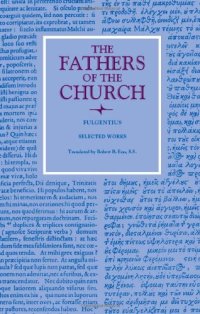
Ebook: Fulgentius: Selected Works
- Tags: Church History, Churches & Church Leadership, Theology, Angelology & Demonology, Anthropology, Apologetics, Catholic, Christology, Creationism, Ecclesiology, Ecumenism, Eschatology, Ethics, Fundamentalism, Gnosticism, Historical, Liberation, Mysticism, Pneumatology, Process, Prophecy, Protestant, Salvation Theory, Systematic, History, Biblical History & Culture, Church History, Historical Theology, Christianity, Religious, World, History, Religion & Spirituality, Agnosticism, Atheism, Buddhism, Hinduism, Islam, Judaism, Literature &
- Series: The Fathers of the Church 95
- Year: 1996
- Publisher: Catholic University of America Press
- Language: English
- pdf
St. Fulgentius of Ruspe was perhaps the most brilliant North African theologian in the era after St. Augustine's death. He wrote widely on theological and moral issues. Between the years AD 519 and 523, Fulgentius engaged in correspondence with a group of Latin-speaking monks from Scythia, and that correspondence is translated into English―almost all of it for the first time―in this volume.
The correspondence is significant because it stands at the intersection of two great theological discussions: the primarily Eastern Christological controversies between the Fourth Ecumenical Council in 451 and the Fifth in 553, and the largely Western Semi-Pelagian controversy, which ran from 427 to the Second Synod of Orange in 529. Contemporary Western scholars normally treat these controversies over Christ and grace separately, but there were noteworthy points of contact between the two discussions, and Fulgentius and the Scythian monks were the ones who drew the connections between Christology and grace most strongly.
These connections suggest that we today may do well to treat Christology and grace more as two sides of the same coin than as separate theological issues. Both sets of issues deal fundamentally with the relation between God and humanity: Christological questions ask how the divine and human are related in the person of the Savior, and grace-related
questions ask how the divine and human are linked in the conversion, Christian life, and final salvation of each Christian. Thus, Fulgentius's correspondence with the Scythian monks can do more than simply aid understanding of sixth-century Byzantine/Roman theology. It can also contribute to our contemporary thinking on the relation between
two of the Christian faith's most central doctrines.
ABOUT THE TRANSLATORS:
Rob Roy McGregor is professor emeritus of French and Latin at Clemson University
and former professor of ancient languages at Erskine Theological Seminary. Among his publications are The Lyric Poems of Jehan Froissart: A Critical Edition, and, with Harry E. Stewart, Jean Genet: A Biography of Deceit: 1910-1951. Donald Fairbairn, who also wrote the introduction and notes for this volume, is the Robert E. Cooley Professor of Early Christianity at Gordon-Conwell Theological Seminary. His books include Understanding Language: A Guide for Beginning Students of Greek and Latin (CUA Press) and Grace and Christology in the Early Church.
St. Fulgentius of Ruspe was perhaps the most brilliant North African theologian in the era after St. Augustine's death. He wrote widely on theological and moral issues. Between the years AD 519 and 523, Fulgentius engaged in correspondence with a group of Latin-speaking monks from Scythia, and that correspondence is translated into English―almost all of it for the first time―in this volume.
The correspondence is significant because it stands at the intersection of two great theological discussions: the primarily Eastern Christological controversies between the Fourth Ecumenical Council in 451 and the Fifth in 553, and the largely Western Semi-Pelagian controversy, which ran from 427 to the Second Synod of Orange in 529. Contemporary Western scholars normally treat these controversies over Christ and grace separately, but there were noteworthy points of contact between the two discussions, and Fulgentius and the Scythian monks were the ones who drew the connections between Christology and grace most strongly.
These connections suggest that we today may do well to treat Christology and grace more as two sides of the same coin than as separate theological issues. Both sets of issues deal fundamentally with the relation between God and humanity: Christological questions ask how the divine and human are related in the person of the Savior, and grace-related
questions ask how the divine and human are linked in the conversion, Christian life, and final salvation of each Christian. Thus, Fulgentius's correspondence with the Scythian monks can do more than simply aid understanding of sixth-century Byzantine/Roman theology. It can also contribute to our contemporary thinking on the relation between
two of the Christian faith's most central doctrines.
ABOUT THE TRANSLATORS:
Rob Roy McGregor is professor emeritus of French and Latin at Clemson University
and former professor of ancient languages at Erskine Theological Seminary. Among his publications are The Lyric Poems of Jehan Froissart: A Critical Edition, and, with Harry E. Stewart, Jean Genet: A Biography of Deceit: 1910-1951. Donald Fairbairn, who also wrote the introduction and notes for this volume, is the Robert E. Cooley Professor of Early Christianity at Gordon-Conwell Theological Seminary. His books include Understanding Language: A Guide for Beginning Students of Greek and Latin (CUA Press) and Grace and Christology in the Early Church.